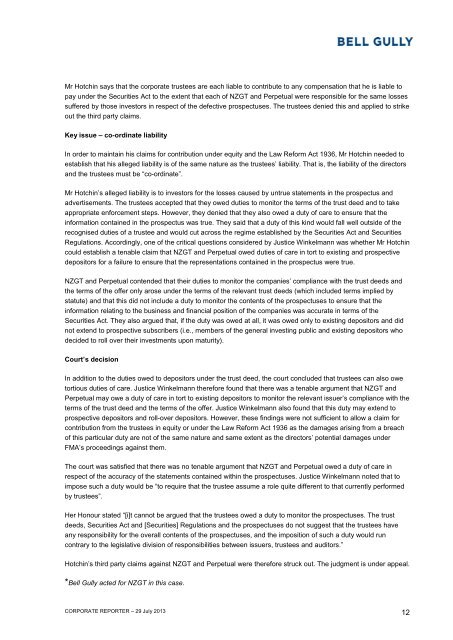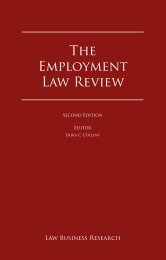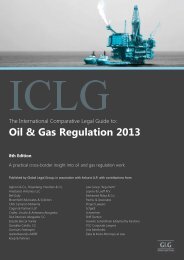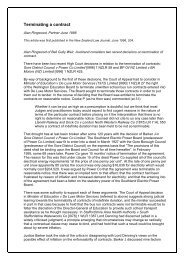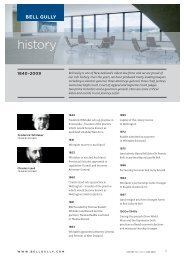Download print version - Bell Gully
Download print version - Bell Gully
Download print version - Bell Gully
- No tags were found...
Create successful ePaper yourself
Turn your PDF publications into a flip-book with our unique Google optimized e-Paper software.
Mr Hotchin says that the corporate trustees are each liable to contribute to any compensation that he is liable to<br />
pay under the Securities Act to the extent that each of NZGT and Perpetual were responsible for the same losses<br />
suffered by those investors in respect of the defective prospectuses. The trustees denied this and applied to strike<br />
out the third party claims.<br />
Key issue – co-ordinate liability<br />
In order to maintain his claims for contribution under equity and the Law Reform Act 1936, Mr Hotchin needed to<br />
establish that his alleged liability is of the same nature as the trustees’ liability. That is, the liability of the directors<br />
and the trustees must be “co-ordinate”.<br />
Mr Hotchin’s alleged liability is to investors for the losses caused by untrue statements in the prospectus and<br />
advertisements. The trustees accepted that they owed duties to monitor the terms of the trust deed and to take<br />
appropriate enforcement steps. However, they denied that they also owed a duty of care to ensure that the<br />
information contained in the prospectus was true. They said that a duty of this kind would fall well outside of the<br />
recognised duties of a trustee and would cut across the regime established by the Securities Act and Securities<br />
Regulations. Accordingly, one of the critical questions considered by Justice Winkelmann was whether Mr Hotchin<br />
could establish a tenable claim that NZGT and Perpetual owed duties of care in tort to existing and prospective<br />
depositors for a failure to ensure that the representations contained in the prospectus were true.<br />
NZGT and Perpetual contended that their duties to monitor the companies’ compliance with the trust deeds and<br />
the terms of the offer only arose under the terms of the relevant trust deeds (which included terms implied by<br />
statute) and that this did not include a duty to monitor the contents of the prospectuses to ensure that the<br />
information relating to the business and financial position of the companies was accurate in terms of the<br />
Securities Act. They also argued that, if the duty was owed at all, it was owed only to existing depositors and did<br />
not extend to prospective subscribers (i.e., members of the general investing public and existing depositors who<br />
decided to roll over their investments upon maturity).<br />
Court’s decision<br />
In addition to the duties owed to depositors under the trust deed, the court concluded that trustees can also owe<br />
tortious duties of care. Justice Winkelmann therefore found that there was a tenable argument that NZGT and<br />
Perpetual may owe a duty of care in tort to existing depositors to monitor the relevant issuer’s compliance with the<br />
terms of the trust deed and the terms of the offer. Justice Winkelmann also found that this duty may extend to<br />
prospective depositors and roll-over depositors. However, these findings were not sufficient to allow a claim for<br />
contribution from the trustees in equity or under the Law Reform Act 1936 as the damages arising from a breach<br />
of this particular duty are not of the same nature and same extent as the directors’ potential damages under<br />
FMA’s proceedings against them.<br />
The court was satisfied that there was no tenable argument that NZGT and Perpetual owed a duty of care in<br />
respect of the accuracy of the statements contained within the prospectuses. Justice Winkelmann noted that to<br />
impose such a duty would be “to require that the trustee assume a role quite different to that currently performed<br />
by trustees”.<br />
Her Honour stated “[i]t cannot be argued that the trustees owed a duty to monitor the prospectuses. The trust<br />
deeds, Securities Act and [Securities] Regulations and the prospectuses do not suggest that the trustees have<br />
any responsibility for the overall contents of the prospectuses, and the imposition of such a duty would run<br />
contrary to the legislative division of responsibilities between issuers, trustees and auditors.”<br />
Hotchin’s third party claims against NZGT and Perpetual were therefore struck out. The judgment is under appeal.<br />
*<strong>Bell</strong> <strong>Gully</strong> acted for NZGT in this case.<br />
CORPORATE REPORTER – 29 July 2013 12


